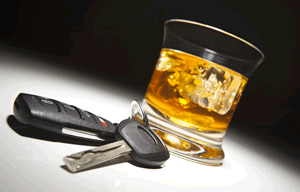Can I use rising BAC to defend against my DUI?
Recently on our legal forum a user asked, “I was arrested last night for DUI. The officer said that at the time of my chemical test my BAC was .09%. It took several hours for them to give me a chemical test. I don’t know much about DUI law, but I know it takes the body some time to absorb alcohol. I am wondering if my BAC was really at the illegal limit when I was arrested for DUI or if it got over the limit while I was waiting for my chemical test. Can you help me?”
What do I need to know about BAC and my body’s ability to absorb alcohol?
You mentioned something that many drivers do not know or understand about the chemical absorption of alcohol: many drivers become more intoxicated after they stop drinking than they were while they were consuming alcohol.
For this reason, if the police wait too long to perform your chemical test, it is possible for some drivers who were not over the legal limit at the time of the DUI to test above the legal limit when the test is finally administered.
This principle is called a rising BAC, and defense attorneys have used a concept referred to as the rising BAC defense to successfully argue that some drivers were not intoxicated when they were operating their vehicle.
If you have questions about your intoxication and your BAC reading, talk to a DUI lawyer. They can review the details of your DUI arrest and determine if this type of defense might work for you.
What do I need to know about blood alcohol concentration?
All states have passed DUI laws which make it illegal to operate a motorized vehicle if your blood alcohol concentration (BAC) is 0.08% or higher. In fact, drivers may be arrested for a per se DUI without any additional evidence of driver impairment. For this reason, it important that chemical tests are performed as close to the time of the DUI arrest as possible and not after the body starts to fully absorb the alcohol.
In fact, although alcohol absorption starts with the first drink, it can take hours for the stomach, small intestines and the liver to fully process the alcohol, leading to a much higher reading several hours after a DUI arrest.
What do I need to know about the rising BAC defense?
Although the rising BAC defense may sound like a get out of jail card for many drivers arrested for DUI, it is not an effective defense for all drivers. In fact, unless your BAC at the time of the chemical test is just a bit higher than the illegal limit, you have not committed any other aggravating factors which point to intoxication, and the chemical test was performed some time following the arrest, it’s tough for a lawyer to argue the rising BAC defense.
In fact, if the state has other evidence of DUI, including swerving, driving too slow, driving the wrong direction, or causing injury to others, they may not need a chemical test with a BAC over the legal limit to prove that you were unable to safely operate a motorized vehicle. If this is the case, you can be arrested and charged with DUI regardless of whether your blood alcohol concentration is above the legal limit.
Bottom Line:
Not all drivers are affected by alcohol in the same manner. Absorption rates as well as impairment can vary based on many factors including gender, the type of alcohol consumed, the rate of consumption, or whether the driver had a full stomach.
Under some conditions, however, the rising BAC defense may be successfully used to prove you were not intoxicated at the time you operated your car.
Related Pages
Latest Question
Will my daughter inherit my debts when I pass?
Prior to the distribution of your assets and income, the courts will pay your debts.
Category: bankruptcy


